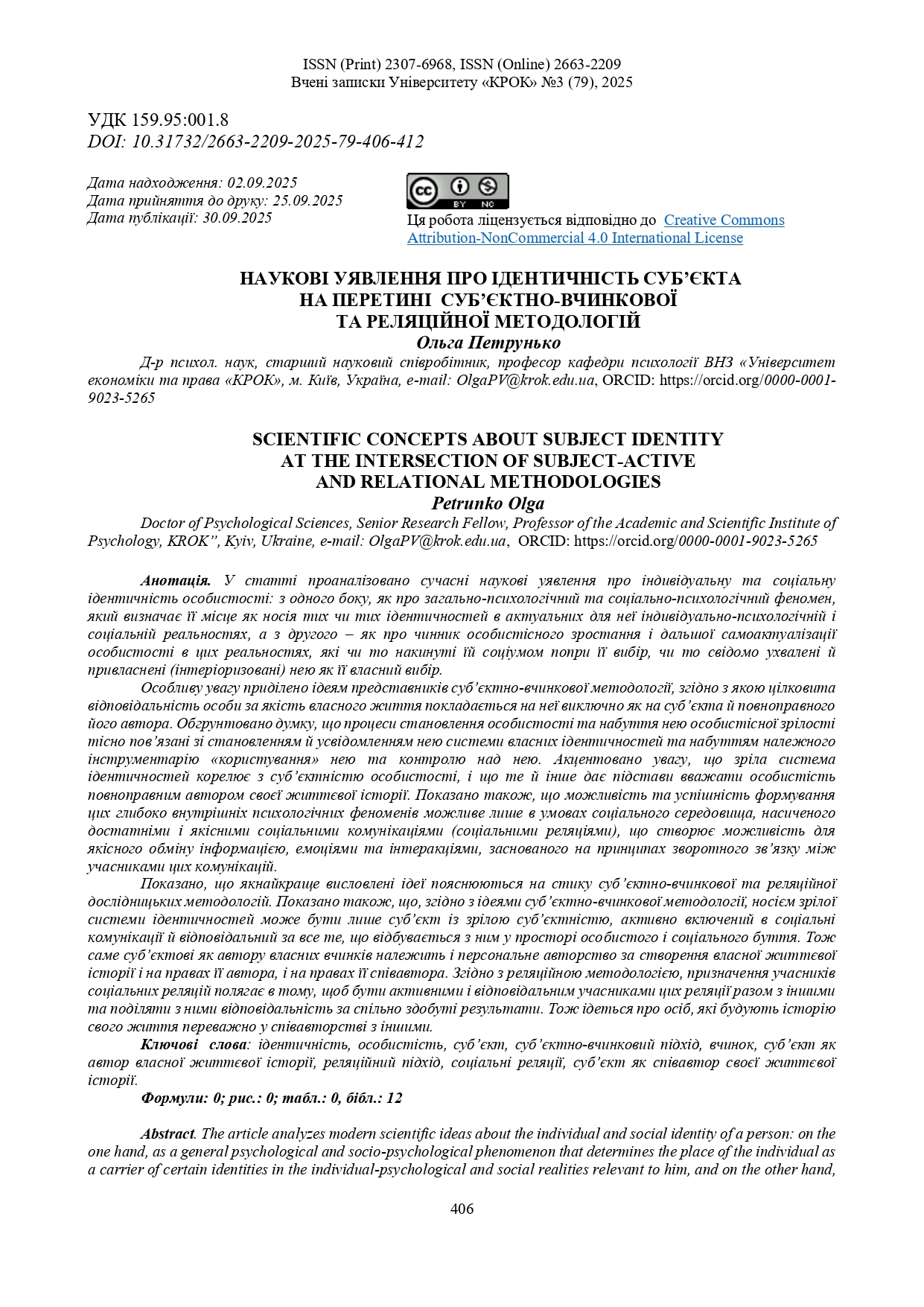SCIENTIFIC CONCEPTS ABOUT SUBJECT IDENTITY AT THE INTERSECTION OF SUBJECT-ACTIVE AND RELATIONAL METHODOLOGIES
DOI:
https://doi.org/10.31732/2663-2209-2025-79-406-412Keywords:
identity, personality, subject, subject-act approach, act, the subject as the author of his life story, relational approach, social relations, the subject as a co-author of his life storyAbstract
The article analyzes modern scientific ideas about the individual and social identity of a person: on the one hand, as a general psychological and socio-psychological phenomenon that determines the place of the individual as a carrier of certain identities in the individual-psychological and social realities relevant to him, and on the other hand, as a factor of personal growth and further self-actualization of the individual in these realities, which are either imposed on her by society despite her choice, or consciously adopted and appropriated (internalized) by her as her own choice.
Particular attention is paid to the ideas of representatives of the subject-action methodology, according to which full responsibility for the quality of one's own life rests exclusively with the subject as its full author. The idea is substantiated that the processes of personality formation and its acquisition of personal maturity are closely related to the formation and awareness of the system of one's own identities and the acquisition of the appropriate tools for "using" it and controlling it. It is emphasized that a mature system of identities correlates with the subjectivity of the individual, and that both give grounds to consider the individual as the full author of his or her life story. It is also shown that the possibility and success of the formation of these deeply internal psychological phenomena is possible only in the conditions of a social environment saturated with sufficient and high-quality social communications (social relations), which creates an opportunity for high-quality exchange of information, emotions and interactions, based on the principles of feedback between participants in these communications.
It is shown that the best expressed ideas are explained at the intersection of subject-action and relational research methodologies. It is also shown that, according to the ideas of the subject-action methodology, the bearer of a mature system of identities can only be a subject with mature subjectivity, actively included in social communications and responsible for everything that happens to him in the space of personal and social existence. Therefore, it is the subject, as the author of his own actions, who also has personal authorship for creating his own life story, both as its author and as its co-author. according to the relational methodology, the purpose of participants in social relations is to be active and responsible participants in these relations together with others and to share responsibility with them for the jointly achieved results. Thus, we are talking about individuals who build the story of their life mainly in co-authorship with others.
Downloads
References
Батраченко, І. Г. (2012). Основи психологічної теорії антиципації. Дніпро: Вид-во ДНУ. 252 с.
Данилевський, І. А. (2025). Дискурс ідентичності в реляційному підході. Вчені записки університету «КРОК», 2(78), 530–543.
Кочубейник, О. М. (2014). Соціальний діалог: соціальні та психологічні передумови комунікативності. Наукові студії із соціальної та політичної психології, 34(37), 150–160.
Ложкін, Г. В., & Плющ, О. М. (2009). Сценарії формування професійної ідентичності. Вісник Національного технічного університету України «Київський політехнічний інститут»: Філософія. Психологія. Педагогіка, 3(27), Ч. 2, 48–56.
Петрунько, О. В., & Даценко, Т. О. (2025). Професійна ідентичність учителя як психологічний механізм увідповіднення себе зі світом. Вісник післядипломної освіти: збірник наукових праць. Серія «Соціальні та поведінкові науки; Управління та адміністрування», 32(61), 125–138.
Татенко, В. О. (2017). Методологія суб’єктно-вчинкового підходу: соціально-психологічний вимір. Київ: Міленіум. 184 с.
Титаренко, Т. М. (2003). Життєвий світ особистості: у межах і за межами буденності. Київ: Либідь. 376 с.
Хорні, К. (2025). Невротична особистість нашого часу. Вінниця: Видавництво Сварог. 304 с.
Erikson, E. (1996). Identity and the life cycle. New York: W. W. Norton & Company, 32-77.
Maslow, A. (1954). Motivation and Personality. New York: Harper and Row Publishers. 411 р.
Rogers, К. (1961). On Becoming a Person: A Therapist’s View of Psychotherapy. Boston: Houghton Mifflin. 420 р.
Ryan, R. M., & Deci, E. L. (2000). Self-determination theory and the facilitation of intrinsic motivation, social development, and well-being. American Psychologist, 1(55), 68–78.

Downloads
Published
How to Cite
Issue
Section
License

This work is licensed under a Creative Commons Attribution-NonCommercial 4.0 International License.

